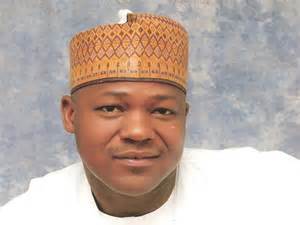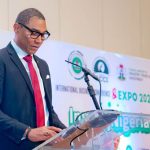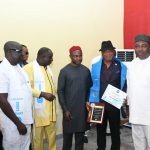Dogara Declares No Legislator Can Be Charged For ‘Tinkering’ The Budget; Says “Padding” Cuts Across
Featured, Latest Headlines, News, Politics Friday, August 12th, 2016
Ayodele Afolabi, Abuja.
ABUJA, NIGERIA (AFRICAN EXAMINER) – No member of the National Assembly (NASS) can be investigated or charged to court for performing their constitutional responsibility of lawmaking including budget, Speaker of the House of Representatives, Hon. Yakubu Dogara, has declared.
Dogara, who spoke in Abuja on Thursday, at the Civil Society Dialogue Session on one year of the Legislative Agenda organized by Policy and Legal Advocacy Centre (PLAC), noted that the 2016 budget had been controversial from the beginning and that it took dialogue, compromise and consensus to produce a workable document.
The Speaker argued that by virtue of the provisions of the Legislative Houses Powers and Privileges Act, no member of the parliament can be charged to court or investigated for exercising their powers of law making.
On the powers of the NASS over budget, Dogara maintained that the appropriation bill is just like any other bill which must be subjected to normal legislative processes and scrutiny.
“The constitution talks about the estimates of revenue and expenditure to be prepared and laid before the National Assembly. The constitution did not mention the word budget. And the reason is very simple. Budget is a law. Going by very pedestrian understanding of law which even a part one law student can tell is that the functions of government is such that the legislature makes the law, executive implements and the judiciary interprets the law.”
“The budget being a law therefore means it is only the parliament that can make it because it is a law. And I challenge all of us members the media and Civil Society Organizations (CSOs) to look at our law and tell me where it is written that the President can make a budget.”
The Speaker maintained that by the provisions of the 1999 constitution, only the NASS has powers to scrutinize the revenue and expenditure estimates submitted by Mr. President.
“What I am saying is further reinforced by section 80(4) of the constitution which says that no money shall be withdrawn from the consolidated revenue fund or any other fund of the Federation except in the manner prescribed by the National Assembly.”
“I want this thing to sink so that we can understand it from here and perhaps it may change the ongoing discourse.”
“If you say the National Assembly doesn’t have the powers to tinker with the budget that we just pass it. When it is prepared and laid we turn it into a bill. If it is a bill how does other bills make progression in the parliament in order to become law?”
“If you contend that we cannot tinker with the appropriation bill, even though it is a money bill, it therefore goes without saying that we cannot tinker with any executive bill.”
Because if they (Executive) bring a bill they will not consult the public to say come and give us your input on this bill. It is the legislature that does that by the instrumentality of public hearing and when we aggregate your views is only our duty as representatives of the people including the media and CSOs to make sure that your voices are reflected so that by the time we hear from you, we now turn it into a legislative bill and when it gets to the President and he signs they say oooohhh some people have padded the bill.”
“It doesn’t even make sense and they have forgotten about the legislative houses powers and privileges Act Sections 24 and 30 sbd others, which means most of the things we do in the National Assembly are privileged. They cannot be grounds for any investigation on the procedure or proceedings to commence against a member of parliament either the Speaker or the President of the Senate once they are done in the exercise of their proper functions.”
The law is there you can go and read it. This is in order to give independence to the legislature. If the legislature is not independent we can’t do anything. If whatever you say on the floor of the House or either in the Committee is subject to litigation then all the members will be in court. And at the end of the day, when debate comes you cannot even air your view. Nobody can hear you.”
“The budget is a law and nobody can object to the fact that only the legislature can make law so only the parliament that can conclude it.”
On zonal intervention projects popularly known as constituency projects for members of the NASS, Dogara said it is the only means through which lawmakers attract Federal projects to their constituents.
This, he said was necessary because the projects selection process is such that it lacks integrity as it was always lopsided against most Federal constituencies.
The Speaker emphasized on the need for more sensitization of the public on the role of the legislature in the appropriation process, saying the misconception of this role led to attempts to discredit the 2016 budget.
He said,”Recent efforts seeking to discredit the document are a consequence of inadequate knowledge of the legal framework governing appropriation in a Presidential democracy. This has, nonetheless, opened a new vista of duty for us as a legislature to enhance both internal competences of members as well as the sensitization of the public on the role of the legislature in a Presidential democracy.
“The 2016 Budget was controversial from the onset but the House handled the controversy with maturity, employing the democratic tools of dialogue, compromise and consensus by which an implementable 2016 Budget was passed and assented to.”
While commending on the role of civil society organizations in educating the public, he stressed that “It is our duty and responsibility to remove any clog in the wheel of progress once we have made the determination that such a situation exists.”
The Speaker explained that the Legislative Agenda was borne out of the House of Representatives’ consciousness of the fact that in order to deliver quality service to the citizenry, the content as well as processes and procedures adopted by the House must be right.
The Speaker also spoke on the need for the Zonal intervention Projects in the Budget:
“The integrity of the project selection process is the bane of the budget process. I ensured also that it reflected in this legislative agenda and this thing started long before we started this discussion on the 2016 budget process as to what happened wrongly or whatever happened.
Now, the reason why this thing is here is that when it comes to National Budget, who actually sits down to say these are the projects we will fund? Is the process open, is it transparent?. Are the people responsible to anyone or it is that we just find these projects littered in the budget.
The answer is no but some people sit down in the budget office. Now, as civil societies, I want to call our attention to one thing, just take the budget, for instance, of a particular Ministry, just check where the directors come from, or some of the officials come from, I wouldn’t want to mention their names, and look at their allocations in that Ministry.
It is all over. If you do that exercise, you will be shocked. And that is why we are calling to question, the integrity of that process. The Minister perhaps comes from a particular region and you will see up to 60, 70 percent of that Ministry’s funds go to that place and in furtherance of our responsibility and duties as representatives of the people, you want to attract projects to those people.
Even in the US, one of the requirements for re-election is for you to attract Federal presence back to your constituency. A Senator brought an airport to his district and just for that he has been elected over 3 times. But the truth is this, if you come from a constituency like mine for instance, let me give you an example of myself, right now, we don’t have a permanent Secretary anywhere, we don’t have a director anywhere, so if you look at the 2016 Budget, if you were to go as proposed by the executive, there is no single Federal funded borehole, even if it is N50, there is no N50 meant for any project in my 3 local governments. Why? Because I don’t have anybody where they are preparing, sharing or making allocation.”
Related Posts
Short URL: https://www.africanexaminer.com/?p=34858






















